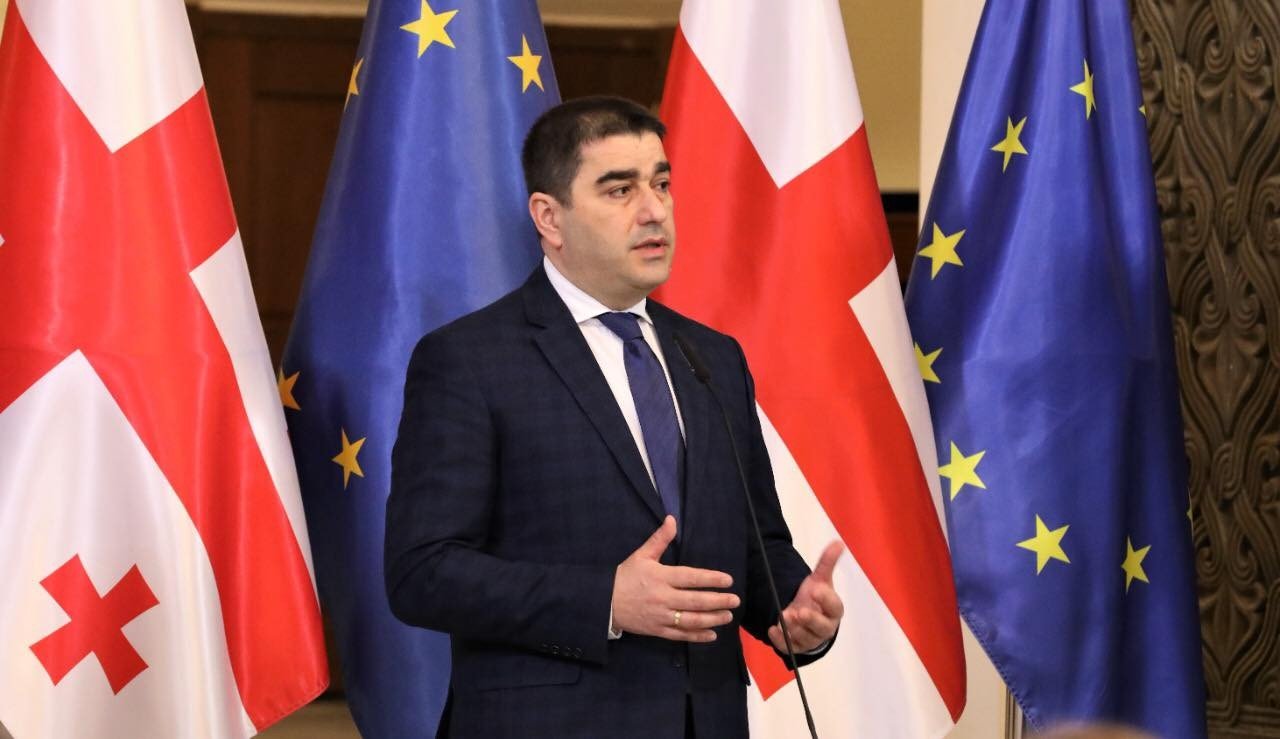Op-ed | Strategic Core of Georgian-Ukrainian Relations Should be Freed from Political Conjuncture
For the sake of the future of Georgian-Ukrainian friendship, the strategic core of our relations should be freed from political conjuncture.
Shalva Papuashvili is the Speaker of the Parliament of Georgia
The most recent statement by the Georgian State Security Service linked some Ukrainian officials of Georgian origin with our country’s domestic affairs. In particular, former Georgian deputy interior minister and now deputy chief of Ukraine’s counterintelligence, Giorgi Lortkipanidze, is thought to be embroiled in plausible domestic upheaval in Georgia this autumn. The purpose of the anticipated turmoil is the change of government in Tbilisi. Foreign funding is also, allegedly, involved in the instigation and planning of this scenario.
This is the second time that Ukrainian high-ranking official is accused by the Georgian state. The first time, exactly two years ago, Lortkipanidze, allegedly, arranged former Georgian president Mikheil Saakashvili’s illegal transfer from Ukraine to Georgia.
Ukrainians are the closest people to Georgians. Despite our own drastic security predicament of continuous Russian occupation, along with absence of a credible security umbrella, such as NATO membership, the Georgian government and people offered strong political support, generous material aid, and humanitarian shelter to our Ukrainian sisters and brothers. And yet, some of the Ukrainian government’s actions defied both logic as well as our common history of brotherly relations.
This paradox of strained political relations amidst the historic cataclysm is perplexing. Given the record of mutual political understanding since our independence and cordial relations between our peoples, our joint struggle for independence is warranted to be coordinated, strategic, and forward-looking. In many ways, Georgia was the precursor, even predictor of what was to happen in Ukraine since 2014 and, in particular, after February 2022. Georgians, better than anyone else, know how bitter and painful foreign aggression and illegal, albeit temporary, occupation can be. We defended our independence in three undeclared wars by Russia, as well as decades of clandestine warfare conducted with so-called hybrid means, adapted from the Soviet playbook.
Misunderstandings in Georgian-Ukrainian relations do not originate in the last couple of years. For quite some time now, over a decade, perhaps, successive governments in Kyiv, on and off, sheltered fugitive Georgian politicians who have been sought for serious crimes in Georgia. Most prominently, Saakashvili, who abandoned his Georgian passport for Ukrainian citizenship and the lucrative governorship in Odesa, continuously stirred political trouble in Georgia. Also, lesser known as they may be, the Ukrainian government is also sheltering former prosecutor-general of the Saakashvili regime, Zurab Adeishvili, and the former deputy interior minister Giorgi Lortkipanidze, who is now in the center of the new political scandal.
All three had serious charges brought against them for the crimes of mass violence, business racketeering, kidnapping, torture in prisons, forced bankruptcies, beating, illegal and forceful appropriation of property, embezzlement of state funds, and, finally, illegal crossing of the border of Georgia. Even though these charges were well-documented and substantiated, Saakashvili, Adeishvili, and Lortkipanidze not only lived freely in Ukraine but also obtained high-ranking government positions in Ukraine’s national council of reforms (which Saakashvili still formally chairs), prosecutor’s office, and counter-intelligence service, respectively. None of them was handed over to Georgia, despite many requests.
In addition, there were some other instances of the Ukrainian officials’ meddling in Georgian politics. Apart from sheltering prominent criminals, Ukrainian authorities and diplomats, in numerous public addresses, tried to rhetorically separate Georgian government from the Georgian people. An unfriendly and unprovoked gesture of summoning Ukrainian ambassador from Tbilisi immediately after the Russian invasion, and then, a year later, effectively, ejecting Georgian ambassador from Kyiv added fuel to Georgian radical opposition’s violent agenda. Moreover, Ukrainian government never distanced itself from the Secretary of the National Security and Defense Council Danilov’s stupefying statement: “If… Georgia and others today were busy returning their territories… this would have exactly helped us a lot because, they [Russians] would be busy with something else, apart from destroying our cities and villages, killing our children and women”.
Georgian-Ukrainian relations are, and should be, strategic. This has been Georgian government’s stance, despite the political quarrels. We supported Ukraine in every case of foreign aggression, especially after 2014 and, much more so, after February 2022. And yet, what we witness is deliberate and intentional blurring of the strategic and the political from the Ukrainian side. Personal connections of the high-ranking officials in president Zelenskyy’s circle with the radical Georgian opposition under Saakashvili’s patronage greatly aggravated political polarization in Georgia. What is especially disheartening is that these actions by the pro-Saakashvili members of the Ukrainian government closely resemble Russia’s favorite tactics of dividing and damaging the Georgian society. This burden further aggravates the great duress from the Russian occupation and continuous political and military pressure.
We have a common cause with the Ukrainian people. Securing our independence, restoration of our territorial integrity, and the progress along the European and Euro-Atlantic integration unites us as never before in history. This is the strategic core of our common interest. Any political meddling that aims at undermining this strategic core is unacceptable, undignified, and plain wrong. We should focus on helping, not weakening, each other.
The views and opinions expressed on Civil.ge opinions pages are those of the authors and do not necessarily reflect the official policy or position of Civil.ge editorial staff
This post is also available in: ქართული
